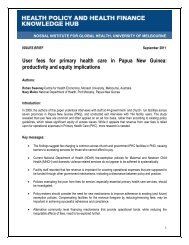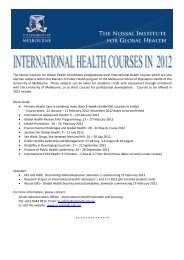AN INTRODUCTION TO MENTAL HEALTH - The Nossal Institute for ...
AN INTRODUCTION TO MENTAL HEALTH - The Nossal Institute for ...
AN INTRODUCTION TO MENTAL HEALTH - The Nossal Institute for ...
Create successful ePaper yourself
Turn your PDF publications into a flip-book with our unique Google optimized e-Paper software.
India. 8 <strong>The</strong>se types of beliefs can delay early recognition of mental disorders and prevent<br />
appropriate treatment and follow-up. 9<br />
Biological factors can include genetics, brain injury, and chemical imbalance in the brain.<br />
Sometimes people experiencing chronic medical problems such as heart, kidney and liver<br />
failure, and diabetes may develop mental health problems such as depression, as living<br />
with a chronic illness can be very stressful.<br />
Stressful life events can contribute to the development of mental disorders e.g. family<br />
conflicts, unemployment, death of a loved one, money problems, infertility and violence. 2,5<br />
A lot of stress may also contribute to an imbalance of chemicals in the brain.<br />
Poverty can place a person at risk of mental disorders because of the stresses associated<br />
with low levels of education, poor housing and low income. Mental disorders are also more<br />
difficult to cope with in conditions of poverty. 1<br />
Difficulties in childhood such as sexual or physical violence, emotional neglect, or early<br />
death of a parent can sometimes lead to a mental disorder later in life.<br />
Unhealthy behaviours such as drug and alcohol abuse can lead to the development of a<br />
mental disorder as well as being the result of a mental disorder.<br />
Step 2<br />
Divide the participants into two groups and ask each group to list all of the<br />
factors that contribute to the development of mental disorders (based on<br />
their current understanding). One participant in each group records the<br />
factors identified by the group.<br />
Allow 10 minutes <strong>for</strong> the groups to complete this task.<br />
Bring the two groups together and ask a representative from each group<br />
to read their list of factors aloud. As the list is read, write each factor on<br />
the board, ignoring duplicate factors from the second group.<br />
If either group suggests factors that are in fact not associated with the<br />
development of a mental disorder e.g. spirit possession, write this on the<br />
board in a separate place from the main list.<br />
Using the ‘Factors affecting mental health’ diagram below, ensure that all<br />
factors are adequately listed on the board. If the groups do not mention<br />
certain factors then the facilitator can add them to the list.<br />
24<br />
<strong>AN</strong> <strong>INTRODUCTION</strong> <strong>TO</strong> <strong>MENTAL</strong> <strong>HEALTH</strong>
















